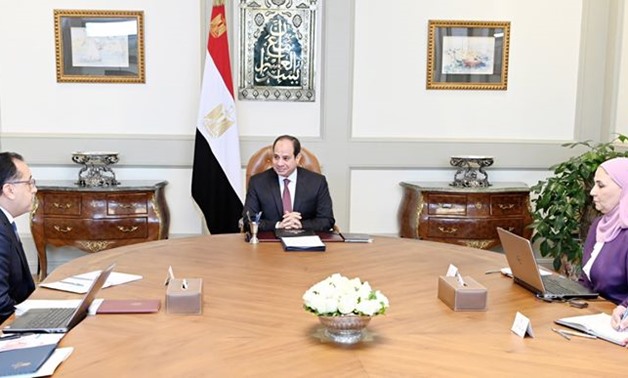
President Sisi meets with Prime Minister Mostafa Madbouli and Nevin Kabbaj, the newly-appointed minister of social solidarity.
CAIRO – 12 January 2020: Egyptian President Abdel Fattah el-Sisi urged establishing the strategy of the Ministry of Social Solidarity on the basis of governance and accurate databases, in order to achieve development and sustaining performance in this vital sector, the Presidency said on Saturday.
This comes as President Sisi met with Prime Minister Mostafa Madbouli and Nevin Kabbaj, the newly-appointed minister of social solidarity.
Sisi also highlighted the need to qualify human cadres, especially in light of the government's plans to move to the New Administrative Capital.
The President also urged providing more support and care for people with special needs, within the framework of the state's efforts to enhance community participation and provide them with the best services.
Ministry of Manpower and Immigration appointed in September 1777 youth including 21 with special needs, according to a statement issued by the ministry.
In March 2019, President Abdel Fatah al-Sisi approved the issuance of Law No. 11 of 2019 of the National Council of People with Disabilities, according to the Egyptian Gazette.
In January 2019, the Parliament gave a final approval on a draft law submitted by the government to establish the National Council for People with Disabilities.
According to the law, the Disabilities Council is an independent body that aims to promote, develop and protect the rights of persons with disabilities and their constitutional dignity.
In December, 2018, Sisi allocated LE 80 million ($4.46 million) of the TahyaMisr Fund in support of people with special needs.
The president made the announcement while attending a celebration marking the International Day of Persons with Disabilities. "People with special needs in Egypt represent 9-10 percent of the total population," Sisi said.
Databases
The Ministry of Communications and Information Technology is collaborating with different ministries and agencies to finalize the integrated national databases, a project that began mid-2016.
The main goals for establishing these databases include the detection and formalization of the informal economy, creating reports and indicators that serve the state and support the decision-making process, providing adequate services to state institutions, citizens, and investors through effective and diverse channels, facilitating the exchange of data and information, building a unified database for economic entities, and building a unified database for benefits received by citizens.

Comments
Leave a Comment